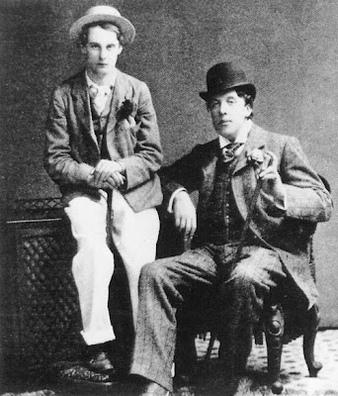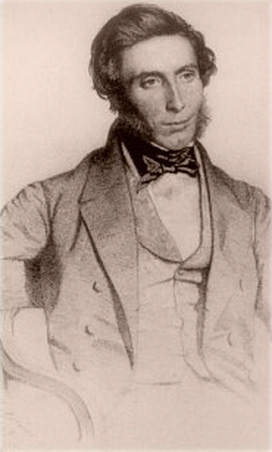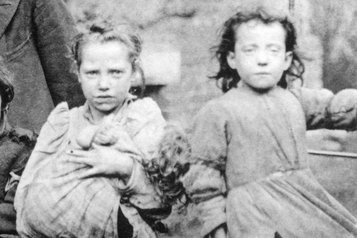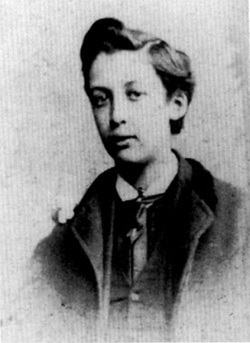 Lord Alfred and Oscar
Lord Alfred and Oscar His friends and attorney advised him to flee the country. If he stayed in England he was unquestionably going to be found guilty and sentenced to prison... most likely to hard labor. His own flippant testimony in the earlier libel case, as well as the testimony of several of the "rent boys" whose sexual services he had purchased, were going to seal the deal. The magistrate, somewhat sympathetic to his situation, made a point of delaying issuing the warrant for his arrest until 5PM, specifically to allow Wilde to catch what they called the "train boat" to France. His wife urged him to go. His friends, seeing which way the wind was blowing, all departed for the Continent.
 Sir William Wilde
Sir William Wilde Why? Later he would say that he could not face the status of being haunted and hunted... and that he actually believed that he could be acquitted.
Insane denial? Magical thinking? Or was there something in his past that encouraged him in his belief about immunity?
Reading about Wilde's father, I thought I might have a found a key to solving the mystery. His father, William R. Wilde, was a celebrated Irish eye and ear surgeon, who was eventually knighted. The scandals surrounding his life appeared not to have disturbed his reputation. He had three children out-of-wedlock before marrying Oscar's mother.
Then, in 1864, Mary Travers, daughter of a Trinity professor, accused him of having drugged her with chloroform and raping her. Sir William did not appear in court, and the jury took this as an admission of guilt, but the sentence they handed down was an insult to plaintiff. They awarded her one farthing in damages... apparently the valuation in their eyes of her physical integrity. His refusal to testify was considered shameful, and it is interesting to note that the sole voice urging Oscar not to take the train boat was that of his mother. (In fairness, she did ask him if he was innocent, and he insisted that he was. Her response was that he must stay. Oscar had also been unequivocal about disavowing his homosexuality when he retained the services of his attorney... severely compromising the reputation of a man who had been a friend as well as a colleague.)

Most infamously, he offered an appeal in the case of Amos Greenwood, who had been found guilty of manslaughter in the case of a nine-year-old girl that he had raped and who had died from syphilis. Neither the defendant nor the defendant's friends argued for his innocence, but Sir Wilde attempted, unsuccessfully, to recruit twelve of his colleagues in maintaining that the girl had died of poor hygiene.
Later, when his coachman was accused of raping and infecting two girls, Wilde came to his defense, and, late in the proceedings, his wife, Lady Wilde came up with an alibi for the coachman. The coachman admitted to his habit of inviting little girls up into the hay loft of his barn to look at kittens... Later, Sir Wilde also came to the defense of a businessman and a railway clerk accused of raping girls.
 Oscar as a boy
Oscar as a boy In "De Profundis," a lengthy and self-serving letter that Wilde wrote from prison, he described the prostituted children he and his lover would acquire:
"People thought it dreadful of me to have entertained at dinner the evil things of life, and to have found pleasure in their company. But then, from the point of view through which I, as an artist in life, approach them they were delightfully suggestive and stimulating. It was like feasting with panthers ; the danger was half the excitement. I used to feel as a snake- charmer must feel when he lures the cobra to stir from the painted cloth or reed basket that holds it and makes it spread its hood at his bidding and sway to and fro in the air as a plant sways restfully in a stream. They were to me the brightest of gilded snakes, their poison was part of their perfection."
"Evil things of life?" Not even human. Panthers or cobras. And, he, Wilde, is their victim.
In light of Sir William's denial about sexually transmitted diseases, it is interesting to note that his son had not had sexual relations with his wife for several years. The reason he had given was that his syphilis, which he had contracted from a prostitute during his student years and had believed to be cured, was, in fact, still virulent. There is no evidence that Oscar ever shared this information with any of the boys with whom he had sexual relations.
We can never know why Wilde did not take the train boat to France when he had the chance, but it does not seem unreasonable that his choices may have been influenced by the values of Sir William Wilde.
In a personal footnote, as an activist against child sexual abuse and as an advocate of victims of pedophilia and incest, I am always disturbed when Wilde is put forward as an LGBT icon. He was no "out and proud" activist. He repudiated his homosexuality in the courtroom, as well as in "De Profundis," where he referred to it as a form of "erotomania," and one of the "most disgusting passions." He was not sentenced to prison for an egalitarian, intimate partnership with Lord Alfred. It was his sexual predation toward underaged boys that indicted him. He never took responsibility for his actions, and upon his release from prison he resumed his sexual predation, traveling with Lord Alfred to Algiers for the express purpose of buying boys on the cheap... boys who could never be called upon in British court to testify against him.

 RSS Feed
RSS Feed
